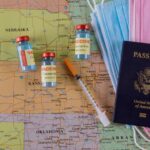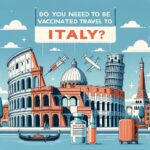Are you planning a trip to Italy? If so, understanding the travel requirements, especially amid the current pandemic situation, is crucial. One pertinent question that travelers may have on their minds is, “Do you need to be vaccinated to travel to Italy?” Navigating through Italy’s travel restrictions and regulations can be overwhelming, but having clarity on vaccination requirements can make the process smoother.
Italy, like many other countries, has implemented specific entry requirements for travelers due to the COVID-19 pandemic. These regulations include guidelines regarding vaccinations and testing, which directly impact individuals planning to visit the country. Understanding these restrictions and staying informed about any updates is vital for a hassle-free travel experience.
In this article, we will provide an overview of Italy’s current travel restrictions and delve into the role of COVID-19 vaccinations in international travel. We will also discuss Italy’s Green Pass and its significance for travelers. Additionally, we will address exemptions and considerations for non-vaccinated travelers as well as provide essential health and safety tips for visiting Italy during these unprecedented times.
Lastly, we will share reliable resources where travelers can access updated information on Italy’s travel requirements. Stay informed and prepared for your upcoming travels by reading through this comprehensive guide.
Overview of Italy Travel Restrictions
Italy has long been a popular destination for travelers from around the world, known for its rich history, stunning architecture, and delicious cuisine. However, with the current global pandemic, it’s crucial for anyone planning a trip to Italy to understand the travel restrictions in place. This section will provide an overview of the current entry requirements for travelers coming to Italy and highlight any specific rules or regulations related to COVID-19 vaccinations.
Current Entry Requirements
As of now, travelers entering Italy are required to fill out a self-declaration form and provide evidence of a negative COVID-19 test result taken within 48 hours before arrival. Additionally, some travelers may be subject to quarantine or testing upon entry based on their recent travel history. It’s important for visitors to stay updated on these requirements as they may change based on the current situation.
COVID-19 Vaccinations and Travel
Many countries around the world have implemented vaccination requirements for international travelers as a way to control the spread of COVID-19. While Italy currently does not require vaccination for entry, having received the vaccine may impact an individual’s ability to comply with testing or quarantine requirements upon arrival. It’s important for travelers to check if their vaccination status will affect their ability to enter Italy.
Importance of Understanding Italy Travel Restrictions
Understanding Italy’s travel restrictions is essential in order to have a smooth and enjoyable trip. By staying informed about entry requirements, vaccination regulations, and any exemptions or considerations available, travelers can plan ahead and ensure that they meet all necessary criteria for entry into Italy. Keeping abreast of any updates or changes to these regulations is also crucial for a stress-free travel experience.
COVID-19 Vaccination and Travel
The COVID-19 pandemic has significantly impacted international travel, prompting many travelers to inquire about the necessity of being vaccinated when visiting countries like Italy. While vaccination requirements for travel vary by destination, understanding the role of COVID-19 vaccinations in relation to Italy’s travel restrictions is essential for anyone planning a trip. This section aims to provide an overview of how COVID-19 vaccination may affect travel to Italy and the specific regulations in place.
Significance of Vaccinations for International Travel
As countries work to control the spread of COVID-19 and protect public health, many have implemented vaccination requirements for incoming travelers. Vaccinations play a crucial role in preventing the transmission and severity of the virus, making them a valuable tool for controlling the spread of COVID-19 among travelers and within local communities.
As such, understanding the vaccination requirements for travel to Italy is important not only for compliance with entry regulations but also for safeguarding personal health and well-being.
Impact of Vaccination on Italy Travel Restrictions
In response to the ongoing pandemic, Italy has established specific entry requirements for travelers coming from various countries. While these requirements are subject to change based on evolving health conditions, current guidelines may include provisions related to vaccination status.
Depending on the traveler’s country of origin and epidemiological risk factors, having proof of COVID-19 vaccination may be a determining factor in whether individuals are permitted entry into Italy. Therefore, those considering travel to Italy should be aware of any regulations regarding COVID-19 vaccinations and understand their implications for entry into the country.
As travelers navigate through evolving travel restrictions and health regulations during these unprecedented times, staying informed about COVID-19 vaccinations and their impact on international travel is crucial. Whether planning a visit to Italy or any other destination, individuals should prioritize their health and safety by adhering to relevant guidelines and seeking updated information from reliable sources before embarking on their journey.
Italy’s Green Pass
When planning a trip to Italy, it is essential to understand the current entry requirements and travel regulations, especially in light of the ongoing COVID-19 pandemic. Italy has implemented specific measures to control the spread of the virus and protect public health. One of these measures is the implementation of Italy’s Green Pass, which has implications for travelers entering the country.
Italy’s Green Pass serves as a digital or paper certification that provides proof of an individual’s COVID-19 vaccination status, recent recovery from the virus, or negative test results. This pass is required for access to certain places and events within Italy, including indoor dining, museums, theaters, and other public venues. Therefore, obtaining and presenting a Green Pass can greatly impact a traveler’s experience in Italy.
To obtain a Green Pass for travel to Italy, individuals must meet certain criteria. This may include being fully vaccinated with an approved vaccine, providing evidence of recovery from COVID-19 within a specified timeframe, or presenting negative test results from a recognized testing facility. It is important for travelers to familiarize themselves with these requirements and ensure that they have the necessary documentation before arriving in Italy.
In summary, understanding Italy’s Green Pass requirements is crucial for anyone considering travel to Italy during the pandemic. Whether you are already vaccinated or considering getting vaccinated before your trip, being informed about these regulations will help ensure a smooth and enjoyable travel experience while prioritizing your health and safety.
- Travelers should check for any changes or updates related to Italy’s Green Pass on official government websites
- Ensure you have all necessary documentation regarding vaccination status or test results before traveling to Italy
Exemptions and Considerations
When considering travel to Italy, it is essential to understand the current entry requirements, especially in light of the ongoing COVID-19 pandemic. One common question that many travelers have is, “Do you need to be vaccinated to travel to Italy?” This section will address any exemptions or special considerations for travelers who are not vaccinated and explore alternative options for visiting Italy.
1. Medical Exemptions: Individuals who have a valid medical reason for not being vaccinated may be exempt from Italy’s vaccination requirements for travelers. It is important to note that these exemptions typically require official documentation from a healthcare provider.
2. Testing Requirements: In lieu of vaccination, non-vaccinated travelers may be required to provide negative COVID-19 test results as part of their entry into Italy. This could include PCR or rapid antigen tests taken within a certain timeframe before travel.
3. Quarantine Protocols: Some regions in Italy may have specific quarantine protocols for non-vaccinated travelers. It is important to research and understand any quarantine requirements based on the traveler’s vaccination status.
It is important for non-vaccinated travelers to thoroughly research and understand the specific exemptions and alternative options available to them when planning their trip to Italy. Additionally, staying up-to-date with the latest travel advisories and regulations from reliable sources is crucial in ensuring a smooth and safe travel experience.
As always, prioritizing traveler safety and following local guidelines and regulations are paramount, especially during international travel amidst the pandemic. By staying informed and making educated decisions, non-vaccinated travelers can still navigate their trip to Italy responsibly and with due consideration for public health.
Traveler Safety and Health Tips
When planning a trip to Italy, it’s essential to consider not only the travel requirements and restrictions but also the necessary safety and health precautions, especially during the ongoing COVID-19 pandemic. Whether you are vaccinated or not, taking proactive measures to prioritize your well-being and that of others is crucial for a safe and enjoyable travel experience.
First and foremost, it is important to stay informed about the current situation in Italy. This includes understanding the local guidelines and regulations related to COVID-19, such as mask mandates, social distancing measures, and any specific rules for public spaces and attractions. Additionally, travelers should be aware of any recent updates or changes to travel requirements, including entry restrictions, testing protocols, and quarantine measures.
For those who are not vaccinated or are unable to receive the COVID-19 vaccine for medical reasons, taking extra precautions is vital. It is recommended to undergo regular COVID-19 testing before and during your trip. Additionally, non-vaccinated travelers should be diligent about following all safety guidelines and protocols to minimize their risk of contracting or spreading the virus.
Lastly, regardless of vaccination status, all travelers should prioritize their overall health before embarking on their trip to Italy. This includes staying up-to-date with routine vaccinations, taking necessary medications or supplements as advised by healthcare professionals, and being mindful of personal hygiene practices while traveling.
| Traveler Safety Tips | Health Tips |
|---|---|
| Stay informed about local guidelines | Get regular check-ups before traveling |
| Adhere to safety protocols | Prioritize overall health needs |
Resources for Updated Information
Italy is a popular travel destination known for its rich history, stunning landscapes, and delicious cuisine. However, before planning a trip to Italy, it is crucial to understand the current travel requirements, especially in light of the ongoing COVID-19 pandemic. This section will provide resources for obtaining updated information on Italy travel restrictions, including any specific regulations related to COVID-19 vaccinations.
As of now, Italy has specific entry requirements for travelers coming into the country. These measures can include providing proof of a negative COVID-19 test result, undergoing testing upon arrival, or presenting a vaccination certificate. The exact requirements may vary based on the traveler’s country of origin and the current situation with the pandemic. It’s important to stay informed about these regulations to ensure a smooth and hassle-free travel experience.
One way to stay updated on Italy travel restrictions is by visiting official government websites such as the Ministry of Foreign Affairs or the Italian National Tourist Board. These sources provide reliable and up-to-date information on entry requirements, visa regulations, and any health-related guidelines for travelers. Additionally, travelers should also check with their local embassy or consulate for specific guidance pertaining to their individual circumstances.
Lastly, staying informed about Italy’s Green Pass system is essential for travelers considering a visit to the country. The Green Pass is used to verify an individual’s vaccination status or recent recovery from COVID-19, and it may be required for accessing certain venues or events in Italy. Understanding how to obtain and present a Green Pass will be crucial for navigating the local regulations during your visit.
| Resources | Website |
|---|---|
| Italian Ministry of Foreign Affairs | www.viaggiaresicuri.it |
| Italian National Tourist Board | www.italia.it |
| Local Embassy/Consulate | Contact your nearest embassy/consulate directly |
Conclusion
In conclusion, understanding the travel requirements for Italy is crucial, especially in the current pandemic situation. Whether it’s for business or leisure, travelers need to be well-informed about entry restrictions and regulations. This includes knowing whether or not you need to be vaccinated to travel to Italy.
Italy has implemented specific travel restrictions in response to the COVID-19 pandemic, including entry requirements for travelers. These regulations may include rules related to COVID-19 vaccinations, so it’s important for travelers to familiarize themselves with these guidelines before planning their trip.
One of the key considerations when it comes to international travel during the pandemic is vaccination. While Italy has its own set of entry requirements, being vaccinated can potentially have an impact on travel restrictions and ease the process of entry into the country.
As part of Italy’s response to managing the pandemic and ensuring public health safety, the country has introduced the Green Pass system. This pass serves as proof of vaccination, a negative test result, or recovery from COVID-19 and is required in certain settings, including for traveling within Italy.
Understanding how to obtain and present a Green Pass is essential for travelers visiting the country. Overall, while vaccination status may affect travel to Italy, there are exemptions and special considerations for non-vaccinated individuals which should be taken into account.
Ultimately, whether you need to be vaccinated or not to travel to Italy depends on various factors including your individual circumstances and current travel regulations. It’s important for travelers to prioritize their health and safety when planning their trip and stay informed about any changes or updates regarding travel requirements for visiting Italy during this time period. By doing so, travelers can ensure a safe and enjoyable experience in one of Europe’s most beautiful destinations.
And that concludes our discussion on whether you need to vaccinated when traveling to Italy.
Safe travels.
Frequently Asked Questions
What Are the COVID Requirements for Italy?
The COVID requirements for Italy currently include the need to fill out a digital localization form before arrival, as well as potentially undergoing testing and quarantine based on one’s vaccination status and the country of departure.
Do You Need the COVID Vaccine to Travel to Europe?
As of now, travelers are required to be fully vaccinated to enter Europe, with some countries also accepting negative test results or proof of recovery from COVID-19. However, these requirements may vary by country and can change frequently.
What Is Required for a US Citizen to Visit Italy?
For a US citizen to visit Italy, they will need a valid passport that does not expire within three months of their planned departure from the Schengen area. They may also need to show proof of COVID-19 vaccination, negative test results, or recovery from the virus, depending on Italy’s current entry requirements.

I’m a passionate traveler, writer, and Italophile. My fascination with Italy’s history, art, and culture has led me on countless adventures across the Italian landscape. Through “I Live Italy,” I share my love for this extraordinary country and aims to inspire others to explore its boundless beauty.




